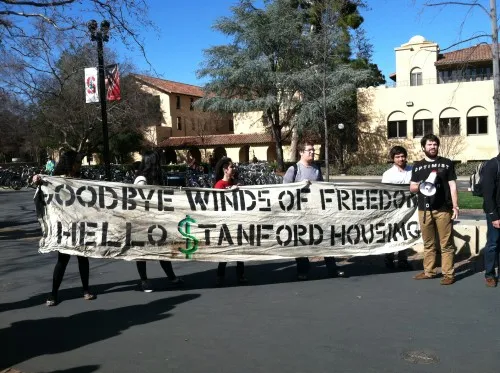Table of Contents
 In recent weeks, Stanford has been home to an unusual flurry of student activism. More specifically, students have mobilized to voice their discontent with two new university actions: (1) Residential Education’s (ResEd) decision to replace the student-led Suites dining with a corporate contractor and (2) the University Registrar’s proposal for classes to start at 8:30 a.m., as opposed to the current start time of 9 a.m., and to require students to obtain permission prior to taking classes with overlapping schedules.
In recent weeks, Stanford has been home to an unusual flurry of student activism. More specifically, students have mobilized to voice their discontent with two new university actions: (1) Residential Education’s (ResEd) decision to replace the student-led Suites dining with a corporate contractor and (2) the University Registrar’s proposal for classes to start at 8:30 a.m., as opposed to the current start time of 9 a.m., and to require students to obtain permission prior to taking classes with overlapping schedules.
In particular, on February 25, around 200 students gathered in White Plaza to protest the controversial Suites dining decision. The protest, led by Ma’ayan Dembo and Miles Unterreiner, was a follow-up to Unterreiner’s four part article in the Stanford Daily. The article not only invalidated ResEd’s claims that the change would save money and improve the health and safety conditions for students, but also pointed out a potential conflict of interest between ResEd and Student Organized Services (SO), a corporate contractor that allegedly has expressed interest in the Governor’s Corner contract for many years. As a conclusion, the article called on ResEd to involve students in the decision-making process.
And just three days later, on February 28, about 20 students met with Vice Provost of Undergraduate Education Harry Elam to discuss the Registrar’s recently proposed 8:30 a.m. start time and the requirement for students to obtain permission prior to double-booking their schedules. Perhaps more illustrative, however, are the 1,725 student signatures obtained (by the time of this writing) for a petition calling on the university to abandon the Registrar’s proposed measures, which the petition labeled as “deplorable” and representative of the “disturbingly common” tendency of the administration to enact change without consulting the student body.
*The Stanford Review *supports our fellow students’ demand for greater accountability and transparency from the university administration, especially when it makes decisions that directly affect student life. Student activism—especially activism directed towards affecting change where it is felt the most, at the level of the university—is an effective exercise in civic responsibility. It is an opportunity to devote our freedom of speech to bring about necessary improvements. It facilities dialogue with authorities. And, perhaps most importantly, activism directly counters the tendency towards indifference, which many critics complain is a common characteristic of Gen Yers.
Yet along with our support for greater student activism, we would like to encourage our fellow students to participate in an activism that is both (1) informed and (2) consistent.
The Suites-dining and earlier class start time controversies serve as excellent examples of informed and misinformed student activism, respectively. Unterreiner’s four-part article is a commendable journalistic expose and was remarkably effective in spurring students to protest (or at least demand further explanations for) ResEd’s unpopular decision.
In contrast, the 1,725 signatures for the petition against the earlier class times and the banning of taking overlapping classes, while constituting an impressive collective effort to fight the proposal, nevertheless reflect a misunderstanding of the truth. Through further investigation, The Review discovered that, if the Registrar’s proposals are passed, not only would the decision to hold classes at 8:30 a.m. remain at the discretion of each department, there will also be no “ban” on double-booking, as the petition seems to let on. Perhaps the Stanford Daily article entitled “Registrar proposes 8:30 a.m. starts, banning double-booked schedules,” was particularly misleading. Nevertheless, students should do more than read an article and jump on the petition bandwagon to remain informed. A more illustrative example: around 20 students attended the meeting with Elam—that comprises around 1.1% of the 1,725 petition signers.
In addition to being informed, The Review encourages Stanford to pursue an activism that is consistent. There are many questions that students need to raise with regards to issues that are equally as pressing and upsetting. Consider, for example, the current state of the ASSU. Total compensation for ASSU officials hovers around $79,350, yet lately it has been difficult to identify the extent of their impact on university life. Students could also demand more fiscal responsibility and transparency, questioning just how well student funding (upwards of $300,000 every year) is being managed—is it efficient, responsible, ethical?
Thus, not only would students benefit from a more informed and consistent activism, Stanford as a whole can continue to be the hub of continuous innovation and improvement that it has always been.





